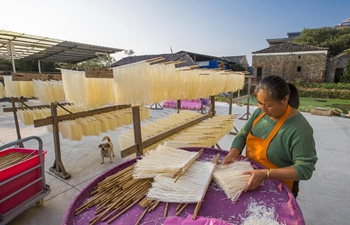NAIROBI, Oct.11 (Xinhua) -- Peter Kanyagia is a Kenyan smallholder farmer who has in the past grappled with diminishing crop yield linked to poor soil health. The middle-aged farmer has nevertheless found a solution to low soil fertility in worms and is happy now that he can feed his family and sell the surplus harvest to the nearby market.
While worm farming is still viewed as a taboo in his community, Kanyagia has defied the odds to ply his trade. He has turned these little red-colored creatures into money-makers.
Kanyagia stumbled on vermiculture as he researched online on climate smart farming after a streak of poor harvests from his farm.
"I had been unhappy with the yields I got from my farm for long, so I started researching on the best way to raise my yields, I stumbled on vermiculite and I developed interest in it. I enrolled for a one-day course at Jomo Kenyatta University of Agriculture and Technology (JKUAT) where I learnt about rearing worms," he said.
After the training, he bought five kilograms of worms and began his agribusiness journey.
Apart from selling worms to other farmers venturing into vermiculture, Kanyagia also harvests vermi-liquid which he uses as fertilizer to grow vegetables.
The worms which are fed on kitchen waste, produce vermicompost or worm poop which is ideal for improving soil structure.
"Food grown using vermicompost tastes better and the yields are higher, I know this from experience. I call it my black gold as it has done wonders on my farm," Kanyagia told Xinhua during a recent interview.
Fred Muli, a vermiculture researcher at JKUAT says compared to ordinary soil, vermicompost contains seven times more nitrogen and phosphorus and eleven times more potassium.
The worm's ability to create 'black gold' from waste is not something many Kenyans farmers are ready to appreciate, but it is quite common in other countries such as Canada, Malaysia, Italy, Japan, the United States and the Philippines.
Apart from breaking down waste into valuable soil good for growing crops, the tiny creatures are also known to eat plastic which is hard to recycle.
According to Kanyagia, to get the most out of rearing worms, they should be fed with different kinds of waste such as kitchen waste, cow dung, weeds, fruits and grass.
"They eat anything and everything which makes rearing them easy. They also thrive well in darkness so I use a lot of dry grass to cover the bed where I rear them completely," said Kanyagia.
Currently, he has 10 beds and each hosts over 20 kilograms of worms. Kanyagia sells a kilogram of red worms at 100 shillings (10 U.S. dollars) and in a good month he can sell up to 200 kg.
Having seen the transformation his farm located on the outskirts of Kenya's capital Nairobi has gone through, Kanyagia's neighbors who were earlier skeptical have slowly warmed up to the idea.
"My critics are now realizing what they have been missing out on, each week I receive many visitors keen to learn about vermiculture. I also train university students pursuing agricultural studies. Synthetic fertilizers are good but over-usage has degraded our soils over time, I think it's time to change tact and farmers are becoming innovative," said Kanyagia.
Depending on how the worms are fed, Kanyagia says compost harvesting can be done two to four times annually.
Muli who has done extensive research on vermiculture says soils treated with vermi-liquid also known as worm tea has a good structure and a healthier appearance.
"With the effects of climate change now upon us, we need to be smarter in the way we grow food and vermicomposting is one of the solutions we have. Farmers who have tried it know the benefits, more farmers are becoming receptive of this idea and we hope this trend will continue," said Muli.
He said that demand for red worms which digest organic material has gone up as individuals and organizations keen to reduce organic waste.













